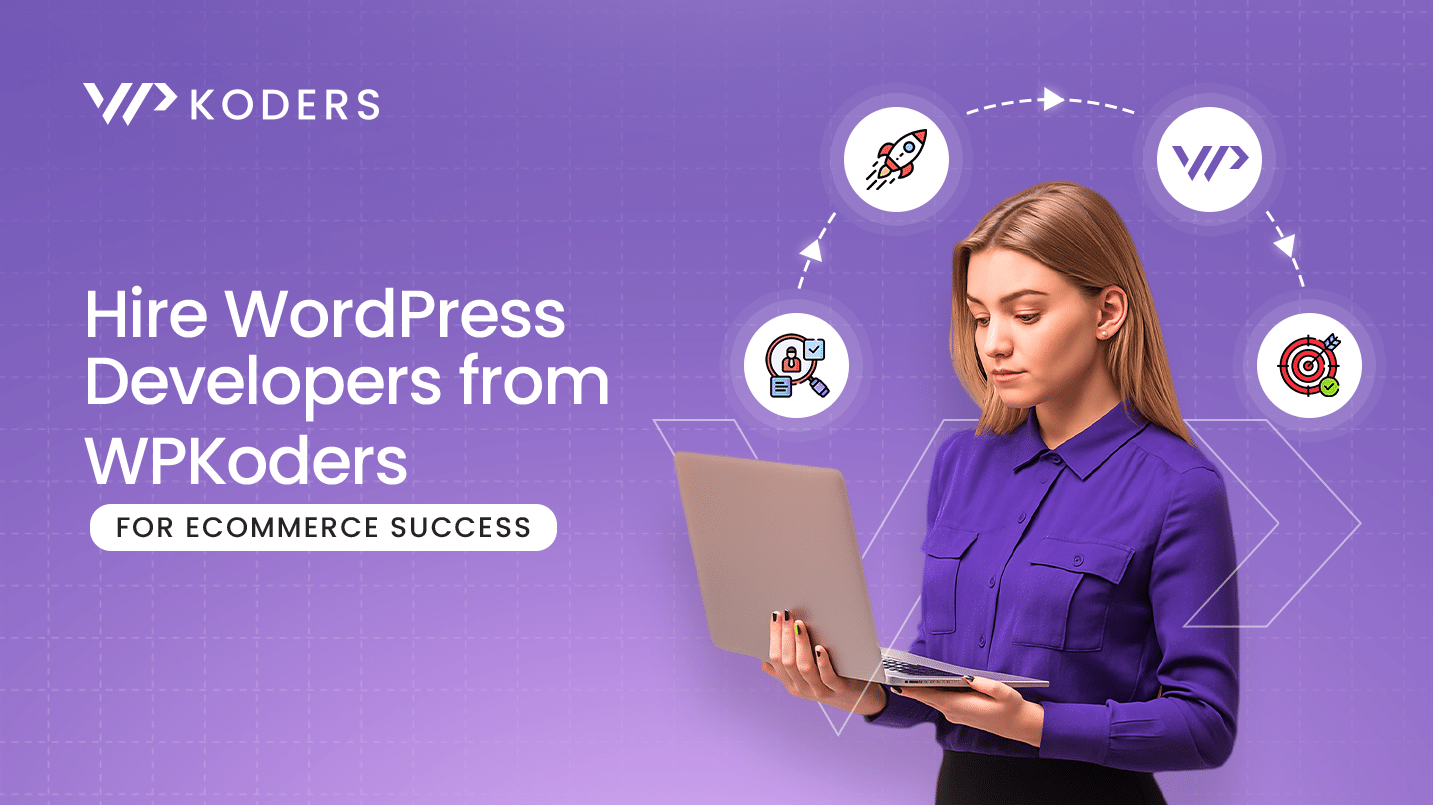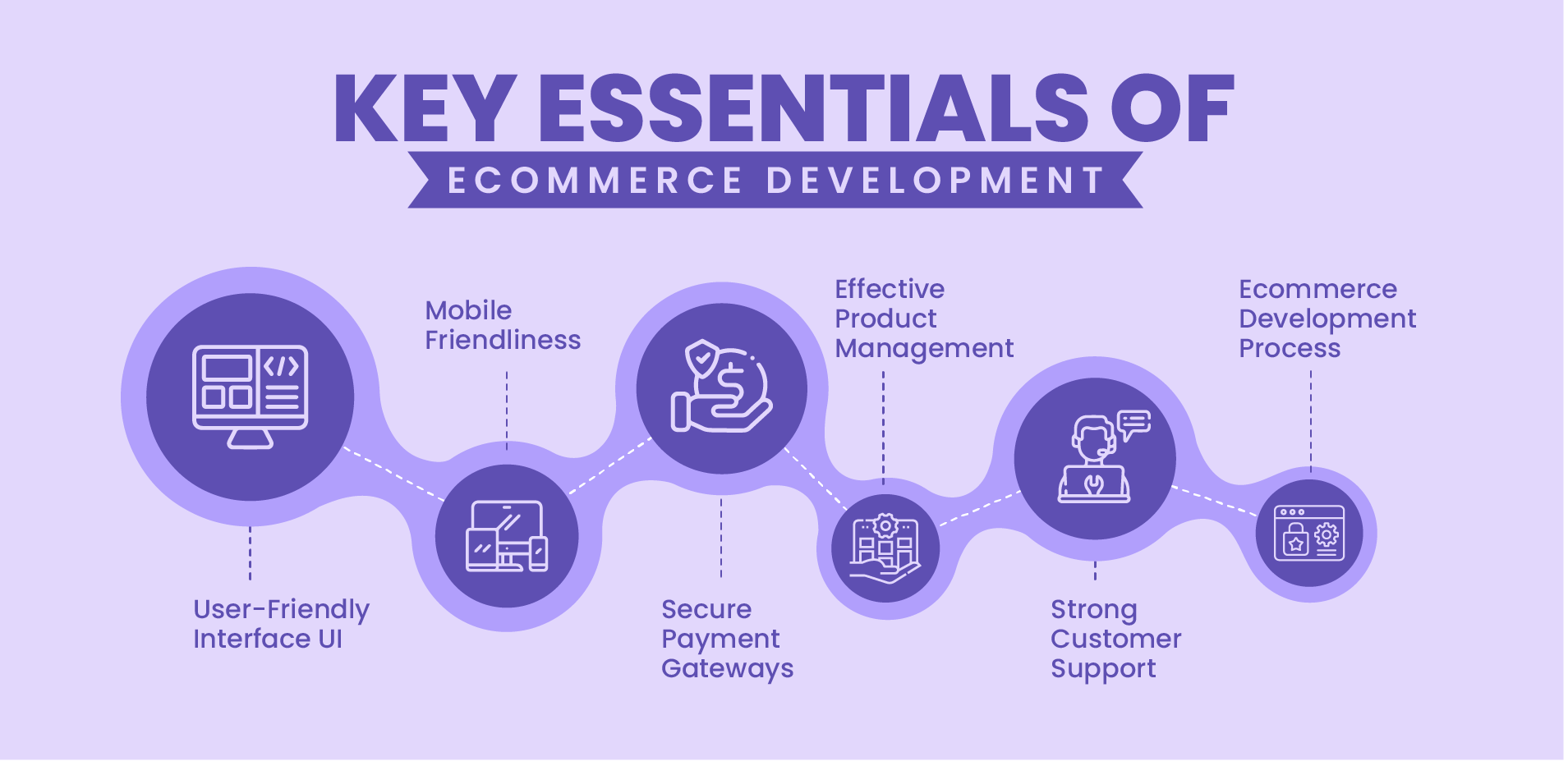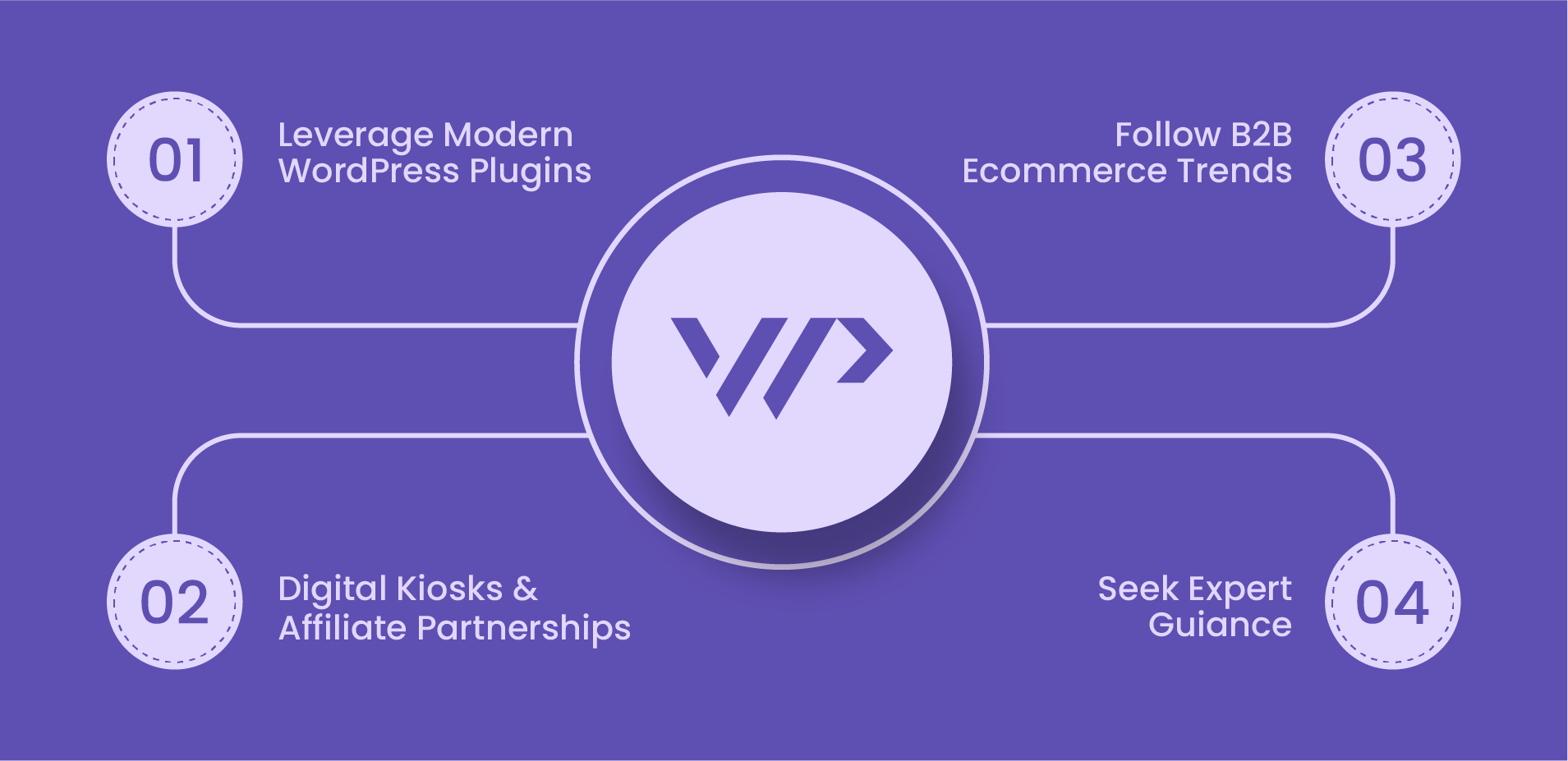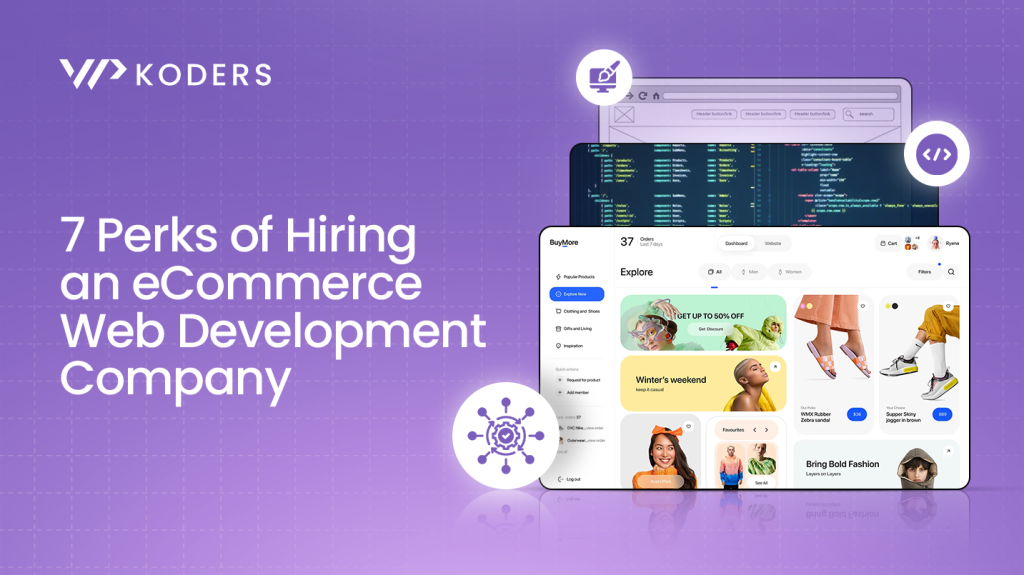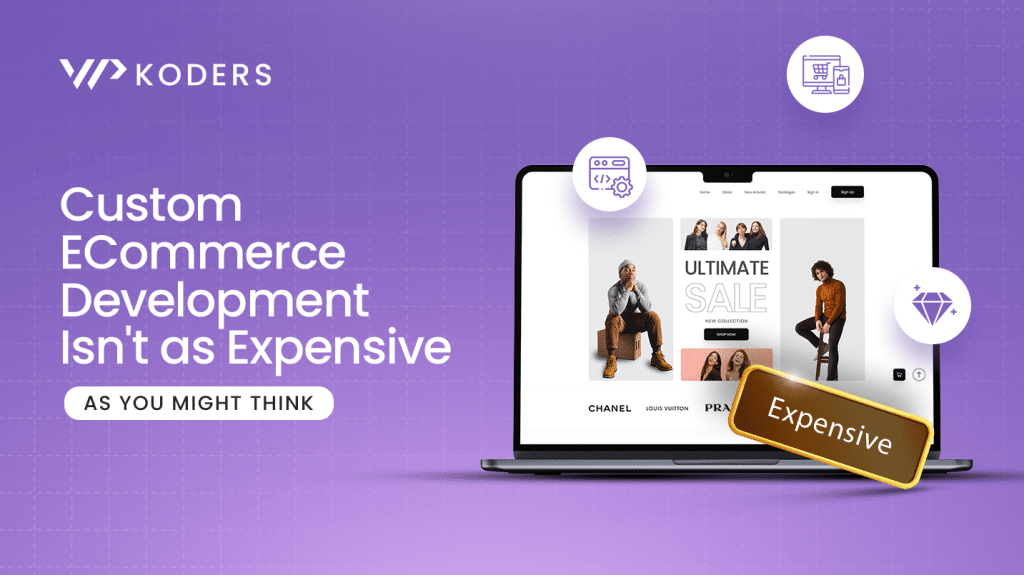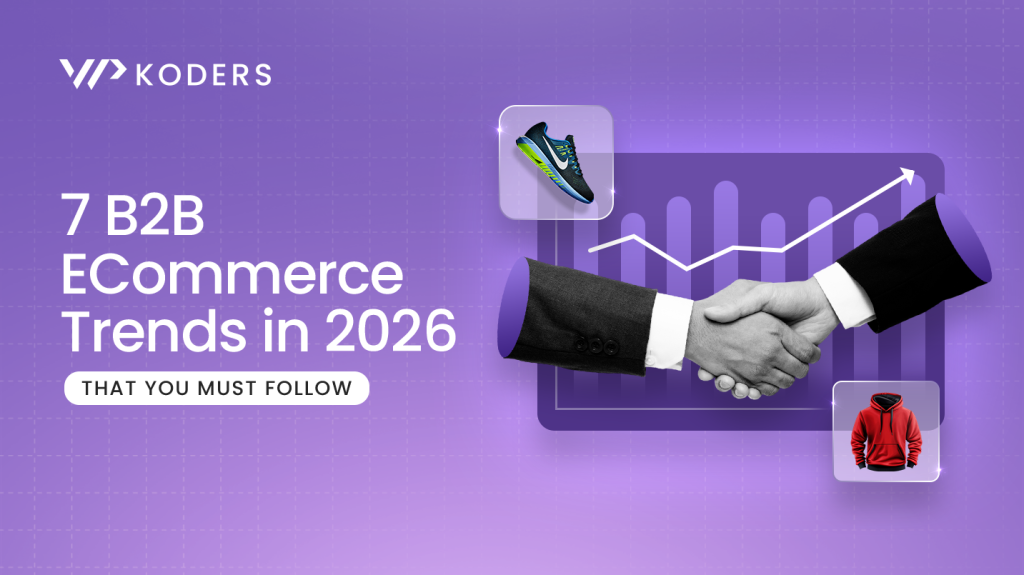An ecommerce business requires careful design and strategic management where every aspect focuses on providing an outstanding customer experience. Powerful digital platforms require an understanding of development principles, a strategic implementation process, and ongoing improvement. It is no longer an option to hire WordPress developers to craft a successful online store. They guide you through the ecommerce development process and enhance your platform for continuous and exceptional growth.
We will cover the key essentials of developing digital stores and walk you through the whole process. It will make it easy to find skillful professionals and embed your business goals within each stage. If you need to hire ecommerce developers or are looking to hire WooCommerce developers, WPKoders has them all under one roof.
Key Essentials of eCommerce Development
Building a successful online store requires a strategic approach that focuses on the customer experience. Besides listing products, ecommerce development involves several key elements that work together to attract, engage, convert, and retain customers.
Enticing User Interface (UI)
At the core of any successful ecommerce platform is an intuitive and visually appealing user interface. An engaging UI enables customers to easily navigate the website, locate products, and complete purchases. It must have clear navigation menus, suitable product categories, effective search features, and a clean layout. A positive user experience increases engagement, lowers bounce rates, uplifts conversions, and ultimately, drives customer satisfaction and brand loyalty.
Mobile-Friendliness
With a large and growing share of online shopping happening on mobile devices, mobile-friendliness is a lifeline. An ecommerce website must be fully responsive, adapting smoothly to different screen sizes and devices like smartphones and tablets. It must include quick load times, touch-friendly buttons, clear font sizes, and an overall user-centric experience. Ignoring mobile optimization can cause lost sales and hurt search engine rankings, since all major search engines favor mobile-friendly sites.
Secure Payment Gateways
Using secure payment gateways is critical for any ecommerce business, as trust is integral to online transactions. It comprises strong data encryption via SSL/TLS protocols, PCI-DSS compliance, and advanced fraud detection systems. Features like 3D Secure authentication, tokenization of sensitive cardholder data, and multi-factor authentication for user accounts add extra security layers. They protect customers’ financial information and increase their confidence in your brand.
Effective Product Management
Efficient product management is crucial for presenting your offerings in the best possible light and ensuring operational smoothness. It encompasses accurate and detailed product descriptions, high-quality images and videos from multiple angles, clear pricing, and real-time inventory updates. Beyond display, product management also involves inventory control, competitive pricing, product feature updates, descriptions, and promotions. A product catalog simplifies backend management, streamlines operations, and enhances the customer’s ability to find exactly what they’re looking for.
Strong Customer Support
Exceptional customer support forms the cornerstone of customer retention on digital channels. Providing prompt, knowledgeable, and accessible assistance throughout the customer journey – from pre-purchase questions to post-purchase support – fosters trust and loyalty. It’s achievable through various channels like live chat, email, phone support, and comprehensive FAQ sections or knowledge bases. Proactive communication, efficient problem-solving, and personalized interactions greatly enhance the customer experience, turning one-time buyers into loyal, repeat customers.
eCommerce Development Process
Building a successful ecommerce platform is an intricate journey that transcends simple website creation. It’s a strategic, step-by-step process that intertwines business objectives, user experience, technological prowess, and continuous optimization. Here’s a breakdown of the key stages involved in bringing an ecommerce vision to life:
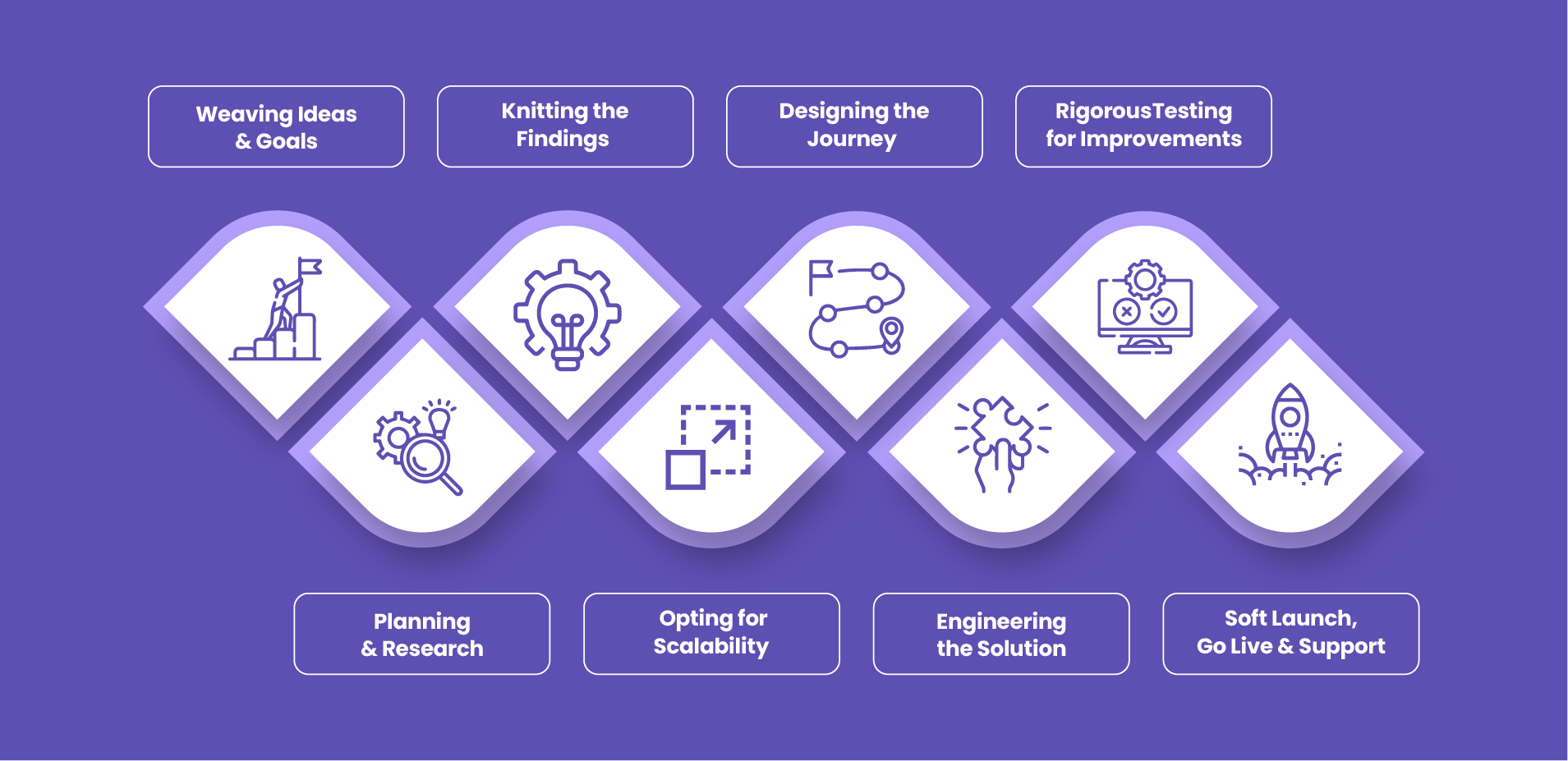
Weaving Ideas & Goals
The initial stage is akin to a brainstorming session, where the core elements of the project are established. This entails defining the business idea, pinpointing the target audience, and setting specific, measurable, achievable, relevant, and time-bound (SMART) goals. What problems will your store address? What unique value will you offer? What are your sales targets, and how will you track success? It involves assessing the competition and market opportunities to ensure the venture is well-positioned for success.
Planning & Research
With the initial ideas and goals set, the next step is a thorough dive into planning and research. A detailed market analysis identifies customer demographics, behaviors, and pain points. Competitor analysis helps identify strengths, weaknesses, and potential gaps in the market. Additionally, we define the project scope, outline its key features and functionalities, and choose the most suitable tech stack. Having a clear understanding of technical requirements, budget limits, and timelines is essential at this point.
Knitting the Findings
This step involves synthesizing all the gathered information into actionable strategies. Based on market research and planning, a detailed functional specification document is created, outlining every aspect of the ecommerce platform. It includes user flows, feature specifications, technical architecture, and content requirements. It finalizes the key decisions about branding, visual identity, and overall user experience, ensuring a cohesive and compelling online presence. This knitting ensures that all future development efforts align with the established goals and research insights.
Opting for Scalability
It’s crucial to select the technology and architecture to handle increasing traffic, growing catalogs, and expanding features without compromising performance. Choosing the right stack enables the creation of robust database structures, leverages cloud infrastructure, and implements strong security measures. This proactive approach prevents costly revisions and guarantees the platform can grow along with the business while performing optimally.
Designing the Journey
This phase focuses on crafting the user experience (UX) and user interface (UI) of the ecommerce store. It involves creating wireframes and prototypes to visualize the website’s layout and navigation. The emphasis is on designing an intuitive, engaging, and seamless shopping experience. A few examples are optimizing product discovery, simplifying the checkout process, and ensuring clear calls to action. The development of high-fidelity mockups and interactive prototypes allows stakeholders to visualize the final product and provide feedback before development.
Engineering the Solution
Here, we begin writing the actual code and integrating all the necessary functionalities, as per the design approvals and technical specifications. We set up the ecommerce platform, develop custom features, integrate payment gateways, configure shipping options, and embed product management systems. Backend development ensures the site’s stability, security, and scalability, while frontend development caters to responsive design and engaging visuals. Database design and implementation are also critical for efficiently managing product information, customer data, and order details.
Rigorous Testing for Improvements
Before launch, the ecommerce platform undergoes thorough testing to find and fix any bugs, errors, or performance problems. Functional testing ensures that all features work correctly, while usability testing verifies the user experience. Performance testing evaluates loading times and responsiveness under different conditions, while security testing spots vulnerabilities. A/B testing compares the design elements or features to aid conversions, resulting in a high-quality, reliable, and user-friendly online store.
Soft Launch, Go Live & Support
The final stage starts with a soft launch, where we introduce the website to a selective audience. It provides real-world testing and valuable feedback in a controlled setting, allowing for final adjustments and bug fixes before launch. After addressing issues and optimizing performance, the platform is now ready for its official ‘Go Live’. It involves migrating to the live production server, setting up domain names, and making the store accessible to the public. Ongoing support and maintenance aid in continuous security monitoring, regular software updates, bug fixes, performance improvements, and excellent customer service. Continuous feedback and analytics guide ongoing improvements, ensuring the platform remains competitive and successful in the long term.
Hire eCommerce Developers
Creating a successful website involves more than an idea; it requires skillful development to build functionality, user experiences, and performance. To hire ecommerce developers, it’s vital to understand the different specialties, especially for popular platforms like WordPress and WooCommerce. Choosing the right expertise ensures that your online store not only functions but also aids scalability and sustainable growth.
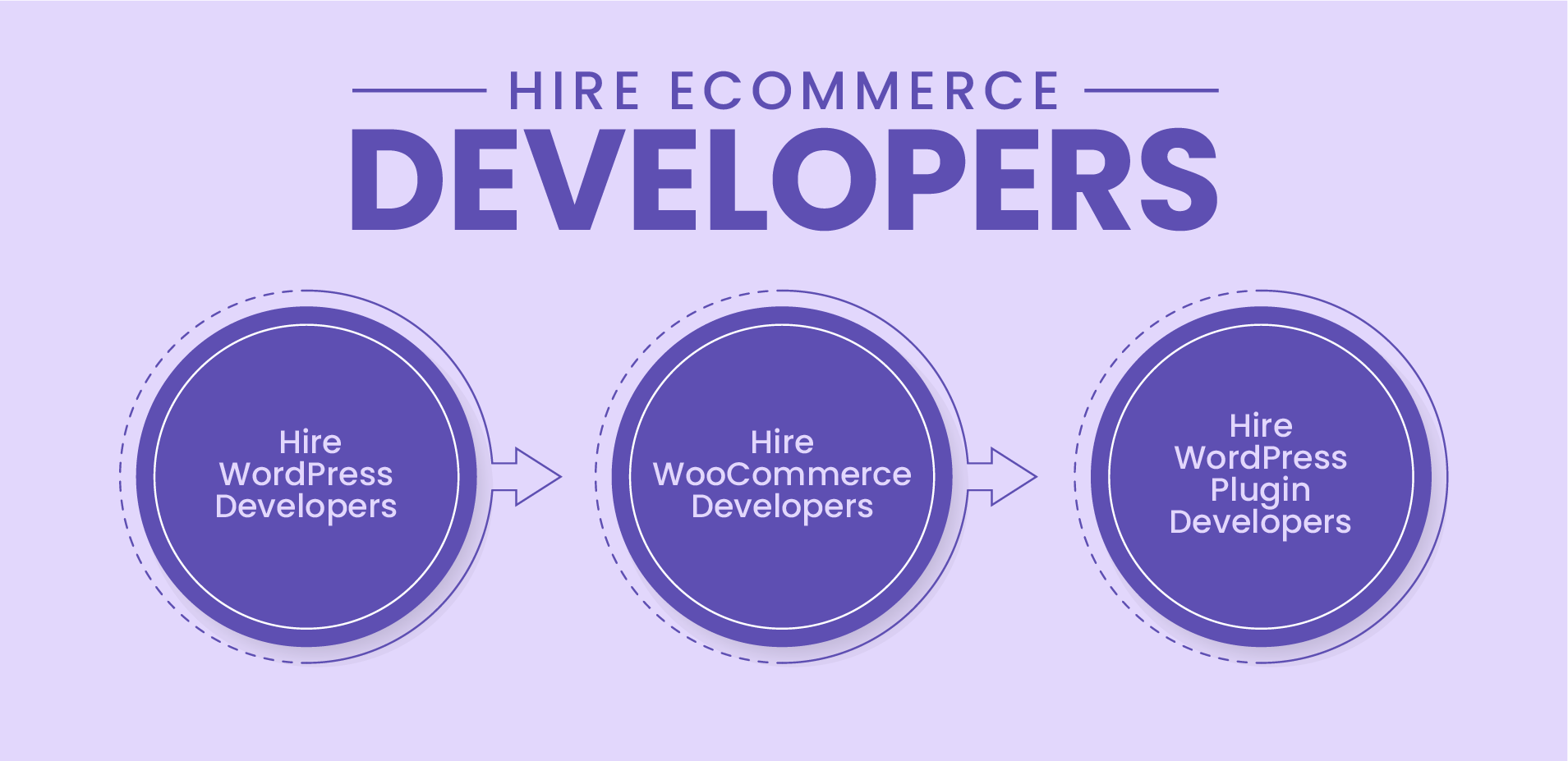
Hire WordPress Developers
Most ecommerce solutions for small to mid-size businesses rely on the flexibility and widespread use of WordPress. When you hire WordPress developers, you access expertise in a content management system that powers nearly half of the internet. These developers are proficient in theme customization, ensuring your store’s design perfectly matches your brand identity. They handle WordPress core updates, security settings, and performance optimization, which are essential for an ecommerce site. Their knowledge also comprises database management, setup configurations, and site architecture, building the foundation before adding any ecommerce features.
Hire WooCommerce Developers
For any ecommerce project on WordPress, it’s crucial to hire WooCommerce developers, if not necessary. WooCommerce is the most popular ecommerce plugin for WordPress, turning a basic website into a fully functional online store. Hire WooCommerce developers who specialize in complex features, product catalogs, shopping cart workflows, checkout processes, and payment gateway integrations. They can customize WooCommerce themes, create custom extensions, and integrate APIs with various shipping providers and tax solutions. Their expertise is essential for setting up product variations, managing inventory, configuring order workflows, and troubleshooting issues, delivering a smooth user experience.
Hire WordPress Plugin Developers
Beyond the core WordPress and WooCommerce features, online stores often need unique functionalities or integrations to stand out and outperform. This is where you must hire WordPress plugin developers who specialize in expanding WordPress’s features through custom plugin development. For custom loyalty programs, advanced filtering options, subscription systems, CRM integrations, and special shipping calculations, they create or modify plugins. They ensure that new features are functional, secure, compliant, and frictionless, thereby boosting your store’s capabilities and competitive advantage.
Convert Your Store into a Selling Machine
Transforming a website from an online store into a cash-printing ‘selling machine’ requires strategic optimization and adaptation to digital trends. It’s more than listing products; it’s creating a dynamic, engaging, and efficient sales process that maximizes conversions and drives growth.
Leverage Modern WordPress Plugins
The power of an ecommerce store, especially one built on WordPress with WooCommerce, largely depends on its extensibility. Using modern WordPress plugins is essential for boosting functionality and enhancing the customer experience. You need advanced analytics to understand customer behavior, CRO plugins for A/B testing and personalization, and SEO plugins for visibility. Look for plugins that increase AOV, automate email marketing, enable dynamic pricing, or add extra security features. The right combination of plugins can automate tasks, customize customer experiences, and deliver valuable insights, making your store more efficient.
Digital Kiosks & Affiliate Partnerships
Expanding your sales channels beyond the traditional website can lead to significant growth. Adding digital kiosks to physical retail locations or at events creates an interactive link between online and offline shopping experiences. It allows customers to browse extended catalogs, check inventory, make purchases on the spot, and complete payments. At the same time, developing affiliate partnerships can greatly extend your reach. By working with influencers, bloggers, or other businesses in your niche, you access new audiences through trusted recommendations. Affiliates serve as your sales force, driving traffic to your store in exchange for commissions, flexibly boosting your selling capacity.
Follow B2B eCommerce Trends.
Even if your focus is B2C, understanding and adapting elements from B2B ecommerce trends can give you a competitive edge. B2B platforms often stand out with features like bulk ordering, tiered pricing, detailed account management, easy re-ordering, and strong customer support. Including these elements can improve the experience for high-volume customers or those with unique needs, making their buying process attractive. Thinking like a B2B platform can help you handle larger transactions better and build stronger, long-term customer relationships.
Seek Expert Guidance
Addressing the intricacies of ecommerce optimization, from technical SEO to conversion psychology, can be challenging. Engaging with ecommerce consultants, digital marketing specialists, or professional ecommerce web development agencies can provide invaluable insights and strategies. Experts can identify hidden opportunities, troubleshoot performance bottlenecks, implement advanced marketing tactics, and leverage the latest technologies and best practices. Their perspective and knowledge can accelerate your store’s transformation into a high-performing selling machine, saving you time and costs.
Conclusion
Building and maintaining a successful ecommerce store is an ongoing journey that requires both strategic vision and careful execution. Prioritizing user-friendly interfaces, ensuring mobile responsiveness, establishing secure payment gateways, managing products, and providing strong customer support are all vital. Our ecommerce development process ensures a solid foundation, from brainstorming ideas and planning to thorough testing and a strategic launch. Choosing scalability from the beginning lets you hire expert developers for WordPress, WooCommerce, and plugin development. Continually work on modern tools, channel expansion, B2B insights, and expert guidance to turn your store into a selling machine. The only reliable name to remember in this regard is WPKoders. We assist you in your journey to success!
